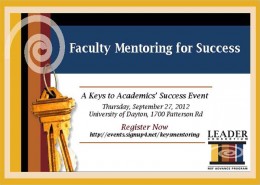 The business world is laden with examples of professionals who found or created invaluable mentoring relationships that helped lead them up the corporate ladder.
The business world is laden with examples of professionals who found or created invaluable mentoring relationships that helped lead them up the corporate ladder.
Many companies, recognizing the immense value of mentoring relationships, have now gone a step further, taking what used to be informal networking, and creating formal mentoring processes to hone top talent and help close the promotional gender gap.
According to LEADER Consortium Program Director Stephanie Goodwin, “leaders at institutions of higher education, including Wright State University, are now recognizing that it’s time for the academy to do the same.”
LEADER Consortium, funded in part by the National Science Foundation ADVANCE Program, is a partnership of four diverse institutions of higher education in the Dayton region: the Air Force Institute of Technology (AFIT), Central State University (CSU), University of Dayton (UD), and Wright State University (WSU). It aims to identify, research and implement best practices to increase the recruitment, advancement and retention of tenure-track women faculty in STEM (Science, Technology, Engineering and Mathematics).
A recent Consortium survey of male and female faculty members suggested that women did not feel they were getting the same access to critical mentoring opportunities. Goodwin says establishing formal, in-house processes for mentoring is essential to creating equitable opportunity.
The consortium is hosting the Keys to Academics’ Success event Thursday, September 27 at 8: 30 a.m. at the University of Dayton to help administrators, department chairs and faculty adopt mentoring programs.
“Despite increases in women’s participation in STEM sciences—more women are getting STEM degrees now than ever—yet we still see disparities in gender representation when it comes to faculty positions in higher education,” said Goodwin. “Institutions with effective formal mentoring programs have more success when it comes to recruiting and retaining women in STEM.”
Wright State University College of Science and Mathematics (CoSM) Dean Yi Li, who credits much of his success to mentoring relationships, is already laying the groundwork for change at CoSM.
“Mentoring opportunities in my life, with my career, have meant so much to me. I have benefited a lot,” said Li. “Everywhere I have gone I have tried to find people who are smarter than me and become friends with them,” Li half-joked.
Li said he recently implemented a new policy at the CoSM of creating a mentoring plan for each new hire in the college going forward that would seek to meet their specific functional needs and goals by pairing them up with a senior faculty member on this campus or another.
Mary Deane Sorcinelli, Ph.D., associate provost for faculty development at the University of Massachusetts Amherst, and Peg Boyle Single, Ph.D., author of Demystifying Dissertation Writing, will speak at the event. Sorcinelli’s message, “Mutual Mentoring: Moving Beyond One-Size-Fits-All Mentoring,” will be directed at faculty members, whereas Boyle will aim her “Developing a Culture of Mentoring STEM Faculty” message toward administrators and department chairs.
In addition to morning workshops for faculty and administrators, a luncheon panel of speakers will include Consortium faculty who will share their own mentoring success stories. Wright State’s Kate Excoffon, a 2012 recipient of the President’s Award for Excellence in early career achievement, and Kimberly Barrett, the new VP of multicultural affairs and community engagement, will join the discussion, sharing their experiences along with representatives from AFIT, CSU and UD.
“The success of this event will come from sharing information about resources for mentoring, networking for mentoring, and awareness,” said Goodwin. “We want to see department chairs and deans go back to their institutions and develop formal processes for mentoring. We want faculty to be able to go back with the tools they need to develop their own functional and flexible plans driven by their own individual needs. And we want all of the participants to know that our office is there to help identify resources for their success.”
Goodwin added that the best mentoring programs are driven by the protégé, are functional and are not one-size-fits-all solutions.
This event is free and open to all STEM and SBS faculty and administrators at AFIT, CSU, UD and WSU.
Register now at http://events.signup4.net/keysmentoring.
Visit www.wright.edu/leader to learn more about LEADER Consortium.

 2026 Alumni Achievement Awards celebrate distinguished Wright State community members
2026 Alumni Achievement Awards celebrate distinguished Wright State community members  Bags, boards and bonding
Bags, boards and bonding  More than 1,000 students to graduate at Wright State’s fall commencement ceremonies
More than 1,000 students to graduate at Wright State’s fall commencement ceremonies  Wright State’s Take Flight Program helps students soar high
Wright State’s Take Flight Program helps students soar high  Wright State Police Department delivers major donation to Raider Food Pantry
Wright State Police Department delivers major donation to Raider Food Pantry 